ACCT3002 Taxation Law Assignment: Assessable Income Issues Analysis
VerifiedAdded on 2023/04/08
|6
|683
|426
Homework Assignment
AI Summary
This assignment analyzes the assessable income of an individual providing legal services. It addresses the key legal issue of whether business receipts from services constitute ordinary income under section 6-5 of the ITAA 1997. The solution applies the cash method of accounting, referencing cases like Carden v F C of T and FC of T v Dixon to determine the character of income from services. The assignment also covers the tax treatment of a recovered bad debt, citing subsection 63(3) of the ITAA 1997. The conclusion affirms the taxability of receipts due to their nexus with income-producing activities, supported by relevant case law and legislative provisions. The assignment demonstrates the application of tax principles to a practical scenario, including the computation of assessable income.
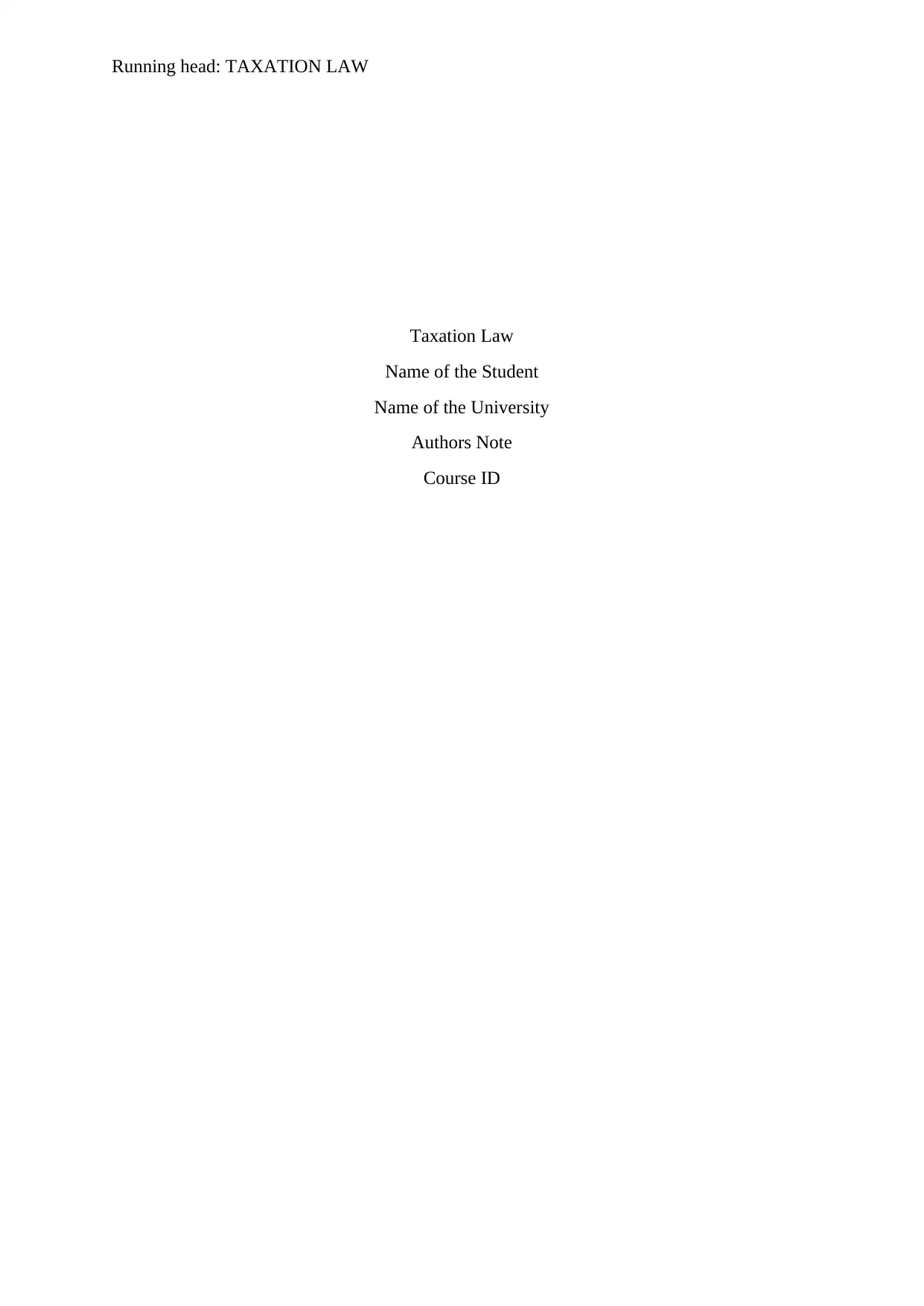
Running head: TAXATION LAW
Taxation Law
Name of the Student
Name of the University
Authors Note
Course ID
Taxation Law
Name of the Student
Name of the University
Authors Note
Course ID
Paraphrase This Document
Need a fresh take? Get an instant paraphrase of this document with our AI Paraphraser
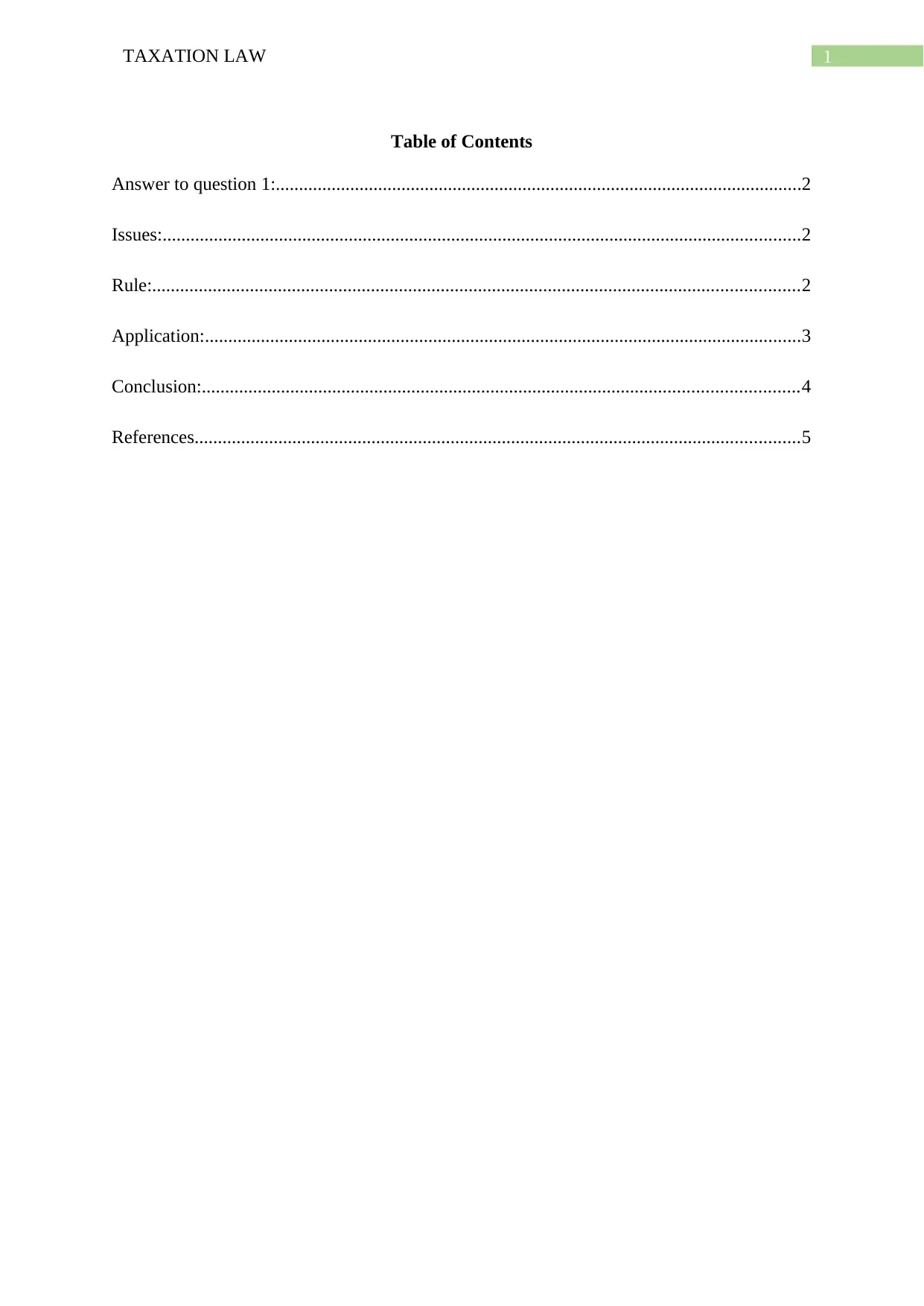
1TAXATION LAW
Table of Contents
Answer to question 1:.................................................................................................................2
Issues:.........................................................................................................................................2
Rule:...........................................................................................................................................2
Application:................................................................................................................................3
Conclusion:................................................................................................................................4
References..................................................................................................................................5
Table of Contents
Answer to question 1:.................................................................................................................2
Issues:.........................................................................................................................................2
Rule:...........................................................................................................................................2
Application:................................................................................................................................3
Conclusion:................................................................................................................................4
References..................................................................................................................................5
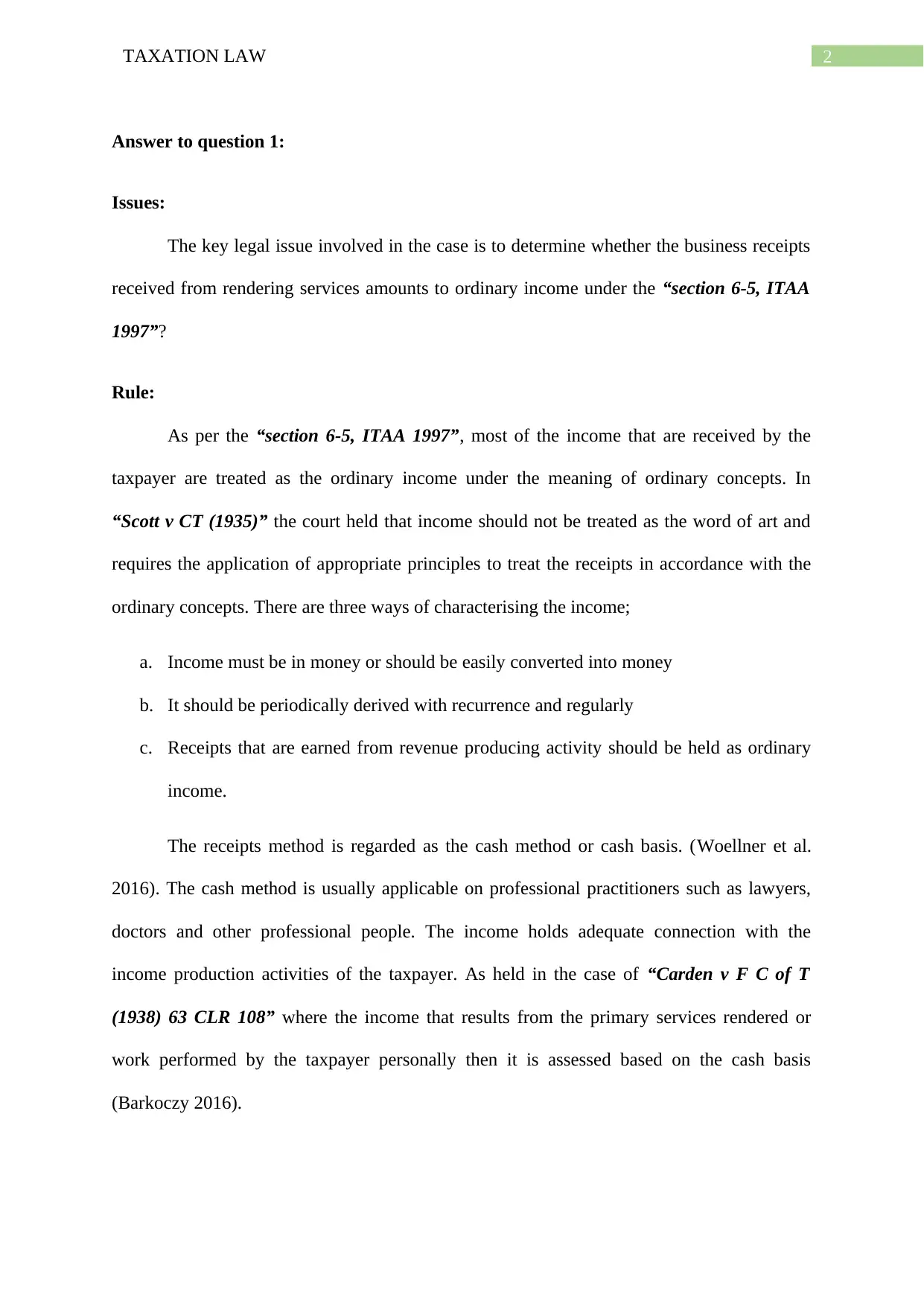
2TAXATION LAW
Answer to question 1:
Issues:
The key legal issue involved in the case is to determine whether the business receipts
received from rendering services amounts to ordinary income under the “section 6-5, ITAA
1997”?
Rule:
As per the “section 6-5, ITAA 1997”, most of the income that are received by the
taxpayer are treated as the ordinary income under the meaning of ordinary concepts. In
“Scott v CT (1935)” the court held that income should not be treated as the word of art and
requires the application of appropriate principles to treat the receipts in accordance with the
ordinary concepts. There are three ways of characterising the income;
a. Income must be in money or should be easily converted into money
b. It should be periodically derived with recurrence and regularly
c. Receipts that are earned from revenue producing activity should be held as ordinary
income.
The receipts method is regarded as the cash method or cash basis. (Woellner et al.
2016). The cash method is usually applicable on professional practitioners such as lawyers,
doctors and other professional people. The income holds adequate connection with the
income production activities of the taxpayer. As held in the case of “Carden v F C of T
(1938) 63 CLR 108” where the income that results from the primary services rendered or
work performed by the taxpayer personally then it is assessed based on the cash basis
(Barkoczy 2016).
Answer to question 1:
Issues:
The key legal issue involved in the case is to determine whether the business receipts
received from rendering services amounts to ordinary income under the “section 6-5, ITAA
1997”?
Rule:
As per the “section 6-5, ITAA 1997”, most of the income that are received by the
taxpayer are treated as the ordinary income under the meaning of ordinary concepts. In
“Scott v CT (1935)” the court held that income should not be treated as the word of art and
requires the application of appropriate principles to treat the receipts in accordance with the
ordinary concepts. There are three ways of characterising the income;
a. Income must be in money or should be easily converted into money
b. It should be periodically derived with recurrence and regularly
c. Receipts that are earned from revenue producing activity should be held as ordinary
income.
The receipts method is regarded as the cash method or cash basis. (Woellner et al.
2016). The cash method is usually applicable on professional practitioners such as lawyers,
doctors and other professional people. The income holds adequate connection with the
income production activities of the taxpayer. As held in the case of “Carden v F C of T
(1938) 63 CLR 108” where the income that results from the primary services rendered or
work performed by the taxpayer personally then it is assessed based on the cash basis
(Barkoczy 2016).
⊘ This is a preview!⊘
Do you want full access?
Subscribe today to unlock all pages.

Trusted by 1+ million students worldwide
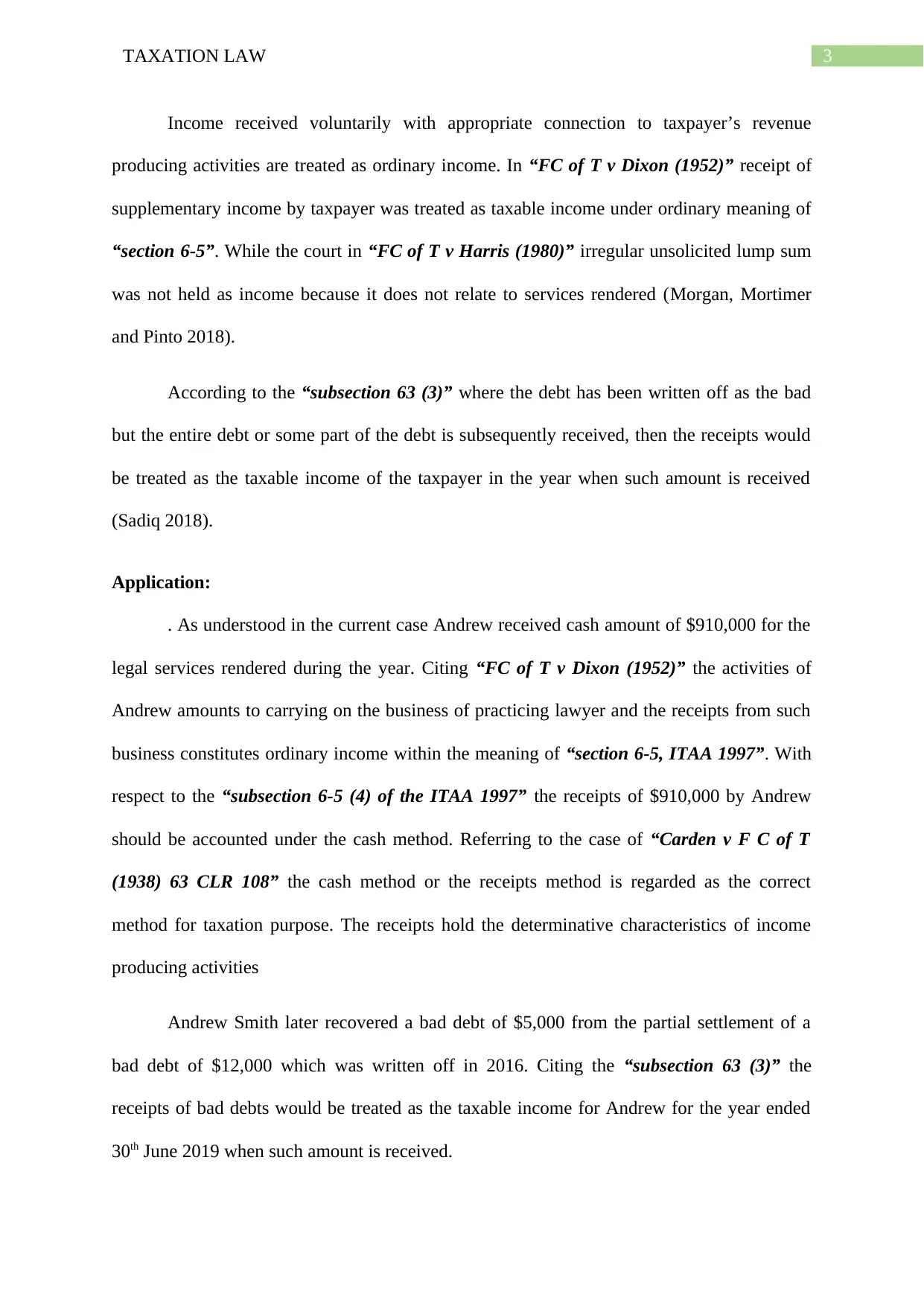
3TAXATION LAW
Income received voluntarily with appropriate connection to taxpayer’s revenue
producing activities are treated as ordinary income. In “FC of T v Dixon (1952)” receipt of
supplementary income by taxpayer was treated as taxable income under ordinary meaning of
“section 6-5”. While the court in “FC of T v Harris (1980)” irregular unsolicited lump sum
was not held as income because it does not relate to services rendered (Morgan, Mortimer
and Pinto 2018).
According to the “subsection 63 (3)” where the debt has been written off as the bad
but the entire debt or some part of the debt is subsequently received, then the receipts would
be treated as the taxable income of the taxpayer in the year when such amount is received
(Sadiq 2018).
Application:
. As understood in the current case Andrew received cash amount of $910,000 for the
legal services rendered during the year. Citing “FC of T v Dixon (1952)” the activities of
Andrew amounts to carrying on the business of practicing lawyer and the receipts from such
business constitutes ordinary income within the meaning of “section 6-5, ITAA 1997”. With
respect to the “subsection 6-5 (4) of the ITAA 1997” the receipts of $910,000 by Andrew
should be accounted under the cash method. Referring to the case of “Carden v F C of T
(1938) 63 CLR 108” the cash method or the receipts method is regarded as the correct
method for taxation purpose. The receipts hold the determinative characteristics of income
producing activities
Andrew Smith later recovered a bad debt of $5,000 from the partial settlement of a
bad debt of $12,000 which was written off in 2016. Citing the “subsection 63 (3)” the
receipts of bad debts would be treated as the taxable income for Andrew for the year ended
30th June 2019 when such amount is received.
Income received voluntarily with appropriate connection to taxpayer’s revenue
producing activities are treated as ordinary income. In “FC of T v Dixon (1952)” receipt of
supplementary income by taxpayer was treated as taxable income under ordinary meaning of
“section 6-5”. While the court in “FC of T v Harris (1980)” irregular unsolicited lump sum
was not held as income because it does not relate to services rendered (Morgan, Mortimer
and Pinto 2018).
According to the “subsection 63 (3)” where the debt has been written off as the bad
but the entire debt or some part of the debt is subsequently received, then the receipts would
be treated as the taxable income of the taxpayer in the year when such amount is received
(Sadiq 2018).
Application:
. As understood in the current case Andrew received cash amount of $910,000 for the
legal services rendered during the year. Citing “FC of T v Dixon (1952)” the activities of
Andrew amounts to carrying on the business of practicing lawyer and the receipts from such
business constitutes ordinary income within the meaning of “section 6-5, ITAA 1997”. With
respect to the “subsection 6-5 (4) of the ITAA 1997” the receipts of $910,000 by Andrew
should be accounted under the cash method. Referring to the case of “Carden v F C of T
(1938) 63 CLR 108” the cash method or the receipts method is regarded as the correct
method for taxation purpose. The receipts hold the determinative characteristics of income
producing activities
Andrew Smith later recovered a bad debt of $5,000 from the partial settlement of a
bad debt of $12,000 which was written off in 2016. Citing the “subsection 63 (3)” the
receipts of bad debts would be treated as the taxable income for Andrew for the year ended
30th June 2019 when such amount is received.
Paraphrase This Document
Need a fresh take? Get an instant paraphrase of this document with our AI Paraphraser
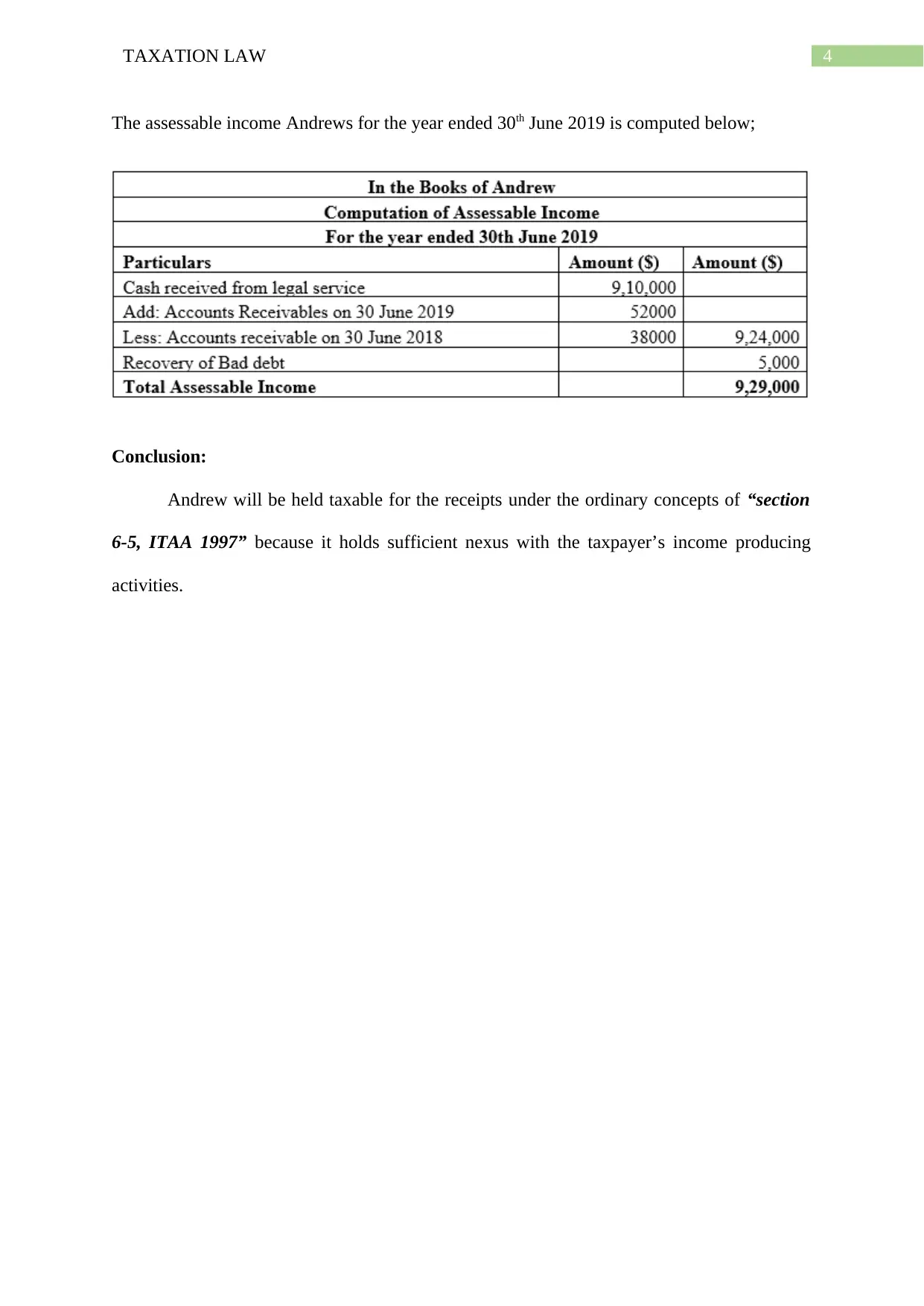
4TAXATION LAW
The assessable income Andrews for the year ended 30th June 2019 is computed below;
Conclusion:
Andrew will be held taxable for the receipts under the ordinary concepts of “section
6-5, ITAA 1997” because it holds sufficient nexus with the taxpayer’s income producing
activities.
The assessable income Andrews for the year ended 30th June 2019 is computed below;
Conclusion:
Andrew will be held taxable for the receipts under the ordinary concepts of “section
6-5, ITAA 1997” because it holds sufficient nexus with the taxpayer’s income producing
activities.
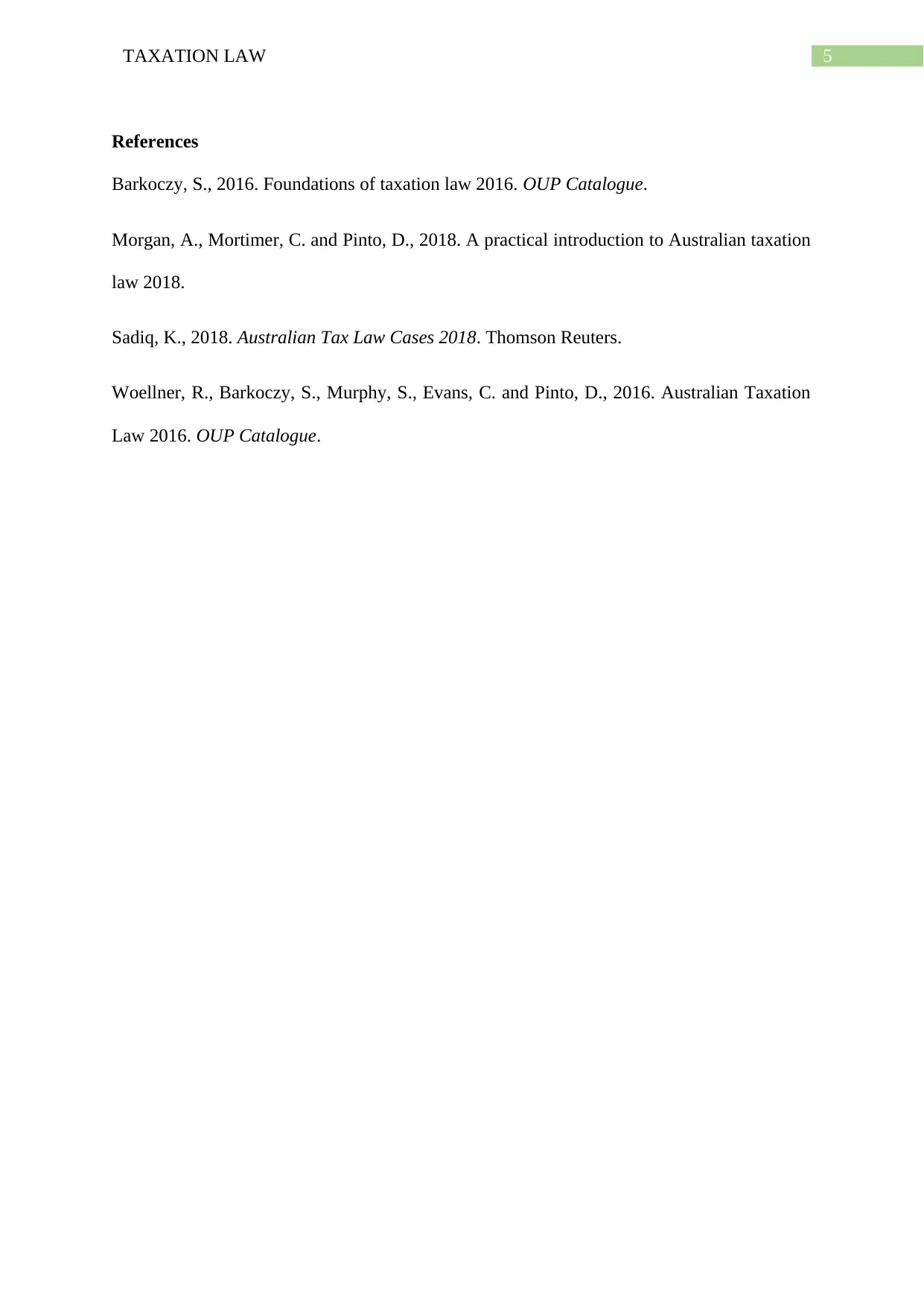
5TAXATION LAW
References
Barkoczy, S., 2016. Foundations of taxation law 2016. OUP Catalogue.
Morgan, A., Mortimer, C. and Pinto, D., 2018. A practical introduction to Australian taxation
law 2018.
Sadiq, K., 2018. Australian Tax Law Cases 2018. Thomson Reuters.
Woellner, R., Barkoczy, S., Murphy, S., Evans, C. and Pinto, D., 2016. Australian Taxation
Law 2016. OUP Catalogue.
References
Barkoczy, S., 2016. Foundations of taxation law 2016. OUP Catalogue.
Morgan, A., Mortimer, C. and Pinto, D., 2018. A practical introduction to Australian taxation
law 2018.
Sadiq, K., 2018. Australian Tax Law Cases 2018. Thomson Reuters.
Woellner, R., Barkoczy, S., Murphy, S., Evans, C. and Pinto, D., 2016. Australian Taxation
Law 2016. OUP Catalogue.
⊘ This is a preview!⊘
Do you want full access?
Subscribe today to unlock all pages.

Trusted by 1+ million students worldwide
1 out of 6
Related Documents
Your All-in-One AI-Powered Toolkit for Academic Success.
+13062052269
info@desklib.com
Available 24*7 on WhatsApp / Email
![[object Object]](/_next/static/media/star-bottom.7253800d.svg)
Unlock your academic potential
Copyright © 2020–2026 A2Z Services. All Rights Reserved. Developed and managed by ZUCOL.





